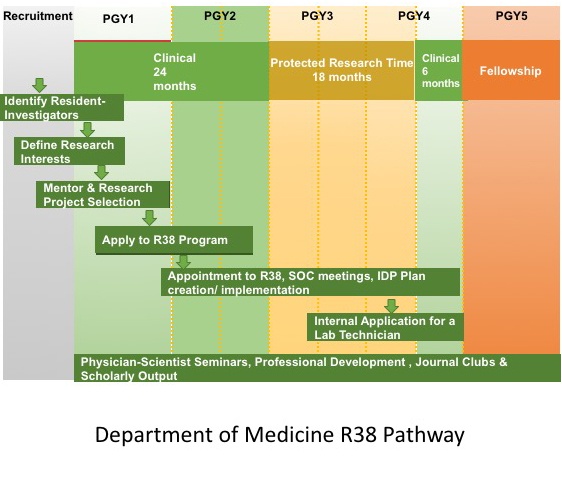
Beginning in 2018, the Department of Medicine is offering the new Duke R38 Research Pathway for residents committed to a career as a physician investigator. This NIH-funded, ABIM-approved opportunity includes a 4-year Internal Medicine residency that incorporates 18 months of protected time for research sponsored by an R38 Stimulating Access to Research in Residency (StARR) grant.
Internal Medicine residents will be selected to participate in this program each year. Residents who wish to pursue this pathway will apply to the program during their intern year or PGY-2 year depending on when they elect to start the program. Residents in this pathway will have a primary research mentor and a scholarship oversight committee that will meet at least twice per year to help residents create an individualized career development plan.
Current R-38 Scholars

Division: Cardiology
Mentor: Svati Shah, MD
Research: Precision Medicine, Genomics, and Predictive Modeling for Disease

Division: Geriatrics
Mentor: Susan Hastings, MD
Research: High-risk medication classes around transitions of care for patients with ADRD

Division: Integrative Immunobiology
Mentor: Garnett Kelsoe, PhD
Research: Investigation of the role of TLR pathway mediators in AID-mediated central B-cell tolerance

Division: Pulmonology
Mentor: Scott Palmer
Research: In vivo and in vitro models of airway fibrosis (or bronchiolitis obliterans) and lung fibrosis (using bleomycin) to dissect further mechanisms of lung injury, repair, and fibrosis

Division: Hematologic Malignancies and Cellular Therapy
Mentor: Stefanie Sarantopoulos, MD PhD
Research: Exploiting the lack of B cell tolerance in patients who have undergone allogeneic hematopoietic stem cell transplantation and subsequently developed chronic graft-versus-host-disease (cGVHD)

Division: Geriatrics
Mentor: Susan Hastings, MD
Research: Examining differences in recruitment and outcomes for those with ADRD in geriatrics-focused primary care clinics (GeriPACTs) compared with more traditional primary care clinics (PACTs) in the Veterans Affairs Health Care System

Division: Cardiology
Mentor: Rob McGarrah, MD
Research: Branched Chain Amino Acid Metabolism in Cardiovascular Disease

Division: Cardiology
Mentor: Svati Shah, MD
Research: Improving risk prediction models for cardiovascular disease by understanding the role of somatic mutations in hematopoietic cells known as clonal hematopoiesis of indeterminate potential
Eligibility and selection process
The Department of Medicine offers the NIH R38 Research Pathway for residents committed to a career as a physician investigator. Residents with commitment to either laboratory-based basic science research or clinical research are eligible to apply. Interviews will be scheduled and carried out with Dr. Scott Palmer, Vice-Chair for Research in the Department of Medicine, and other members of the selection committee who will make a decision about appointment to the R38 pathway with Dr. Zaas’ approval. Up to a total of two residents in good clinical standing will be offered to embark on the R38 Pathway at the beginning of JAR year.
Selected residents appointed to the R38 research pathway will establish a track record of scholarly activities, including:
- Submission of an application for an external individual career development award (NRSA F32 or K38/StARRTs)
- Participation in scientific meetings
- Submission of research manuscripts to peer-reviewed journals
Benefits of the program include:
- 18 months of 80% protected time for research during the 48 month program
- An opportunity to apply for a technician or research assistant to maintain research productivity during the blocks of clinical residency training
- Increased attractiveness for Duke School of Medicine subspecialty fellowship programs
- Funds to support conference travel and research needs
- Eligibility to apply for a new NIH early career award (K38 Stimulating Access to Research in Residency Transition Scholar)